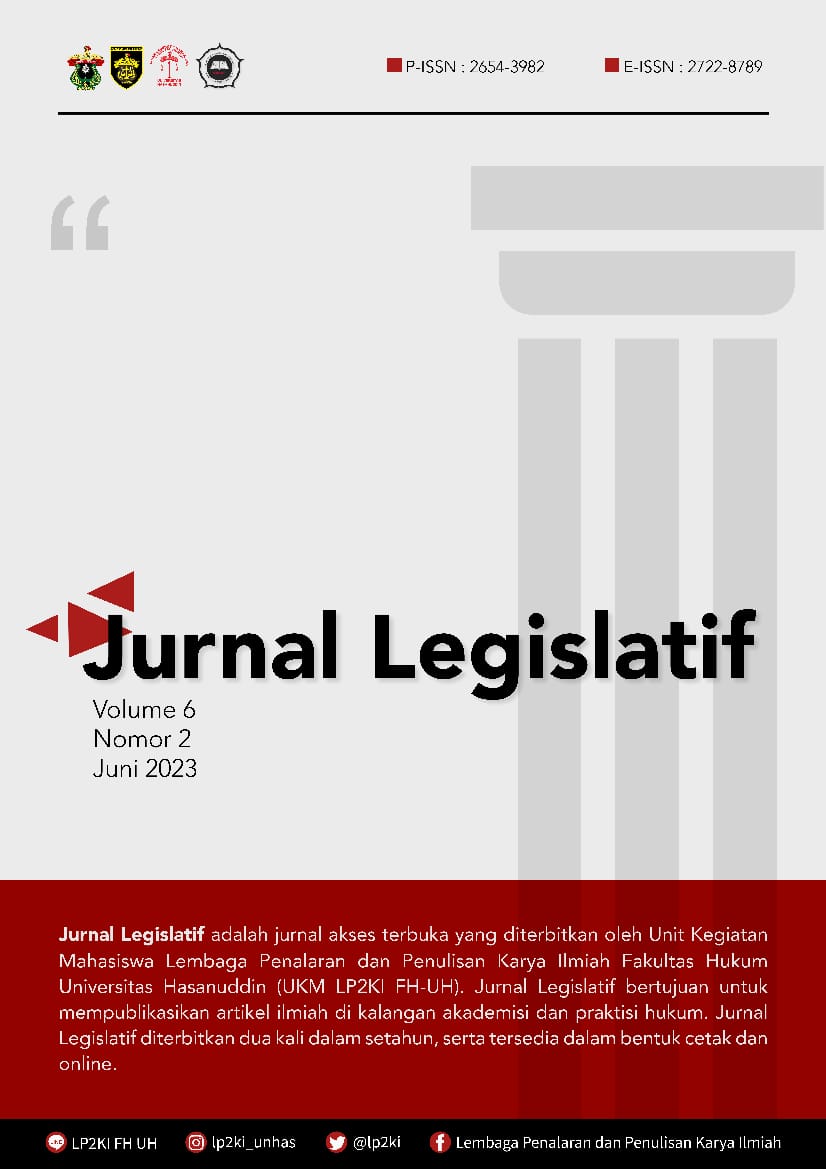HYBRID WORK: EFFICIENCY OF DWI ELECTION SYSTEMS BASED ON E-VOTING AND CONVENTIONAL TO BOOST TRANSPARENCY IN 2024 ELECTIONS
DOI:
https://doi.org/10.20956/jl.v6i2.27123Kata Kunci:
Election 2024, E-Voting, Conventional, Hybrid WorkingAbstrak
Dinamika digitalisasi mengantarkan kita pada keterbukaan informasi serta efisiensi kerja yang lebih baik. Pesta demokrasi terasa sangat dekat, tahun 2024 akan menjadi puncak pesta demokrasi yang beriringan dengan perkembangan teknologi dan informasi, sejalan dengan itu dengan peran serta digital akan membawa Pemilu 2024 menjadi ranah yang lebih transparan. Namun, pada kenyataannya Indonesia masih terkungkung pada permasalah infrastruktur jaringan dan wilayah yang belum merata. Dengan jumlah penduduk serta daerah yang begitu luas penyamarataan infrastruktur jaringan membutuhkan waktu lebih. Penerapan sistem pemilu dengan cara konvensional dinilai kurang efektif dalam mengakomodir estimasi rekapitulasi suara, maka dibutuhkan sistem lain untuk menyokong kekurangan pada pemilu konvensional. Penulisan karya tulis ilmiah ini bertujuan untuk mengetahui bagaimana upaya dalam penerapan hybrid working serta pencapaian solusi dengan diberlakukannya konsep hybrid working dengan penerapan dua sistem berbasis e-voting dan konvensional. Tipe penelitian yang digunakan adalah penelitian hukum normatif dengan pendekatan Perundang- Undangan (Statue approach), Pendekatan konseptual (Conseptual approach) dan Pendekatan perbandingan (Comparative approach). Bahan hukum yang digunakan adalah bahan hukum primer dan bahan hukum sekunder yang diperoleh dari studi kepustakaan, bahan hukum yang terkumpul kemudian dianalisis secara deskriptif kualitatif. Hasil penelitian ini menunjukkan bahwa penerapan pemilu dengan satu sistem, yaitu sistem konvensional masih menuai banyak permasalahan di beberapa aspek terutama aspek transparansi, maka penerapan e- voting hadir untuk melengkapi kekurangan dari sistem pemilu konvensional. Melihat struktur wilayah serta infrastruktur jaringan yang belum merata maka berdasarkan hasil analisa penerapan konsep hybrid working pada pemilu dapat menyeimbangkan kedua sistem dengan harapan pemilu 2024 akan menjadi wadah demokrasi yang lebih efisien, efektif dan transparan.
Referensi
Anistiawati, Made Leita. “Implementasi Kebijakan Penerapan Elektronik Voting (E-voting) Dalam Pemilihan Kepala Desa.” Fakultas Ilmu Sosial dan Ilmu Politik Universitas Udayana.
Ardipandanto, Aryojati. “Permasalahan Penyelenggaraan Pemilu Serentak Tahun 2019.” INFO Singkat 11 no. 12 (2019): 27. https://sdip.dpr.go.id/search/detail/category/info%20Singkat/id/951.
Badan Pusat Statistik. “Rencana Strategis BPS.” Accessed 11 Mei 2022. https://www.bps.go.id/menu/2/rencana- strategis bps.html#masterMenuTab6.
Badan Pusat Statistik. “Statistik Telekomunikasi Indonesia 2021.” Accessed 12 September 2022. https://www.bps.go.id/statistik-telekomikasi- Indonesia.
Badruttaman, Nurul. “Akselerasi Transformasi Digital untuk Pelayanan Publik yang Optimal.” Kementerian Agama Republik Indonesia. Accessed 30 September 2022. https://kemenag.go.id/read/akselerasi- transformasi-digital-untuk-pelayanan-publik-yang-optimal-xkkae.
Bosque. “Pengertian Kedaulatan Rakyat Menurut Para Ahli.” Seputar Pengetahuan. Accessed 1 December 2021. https://www.seputarpengetahuan.co.id/2021/12/pengertian-kedaulatan-rakyat-menurut-para- ahli-lengkap.html.
Brookings. Accessed 12 September 2022. https://www.brookings.edu/articles/how-electronic-voting-machines-have-improved-indias-democracy/.
Dewata, Mukti Fajar Nur dan Yulianto Achmad. Dualisme Penelitian Hukum, Normatif dan Empiris. Yogyakarta: Pustaka Pelajar, 2006.
Fajar, Moh. Ibnu dan Fauzin. “Sistem E-voting: Upaya mewujudkan pemilu yang jujur dan adil.” Jurnal Simposium Hukum Indonesia 1 no. 1 (2019): 595. https://journal.trunojoyo.ac.id/shi/article/view/6388.
Gupta, Ruchika. “E-voting Via Blockchain: A Case Study.” GeekyAnts. Accessed 11 Mei 2022. https://techblog.geekyants.com/e-voting-via-blockchain-a-case-study.
Kliwantoro, D. DJ. “Pakar sebut “e-voting” pemilu sangat semungkinkan.” ANTARANEW. Accassed 24 March 2022. https://www.antaranews.com/berita/pakar-sebut-e-voting-pemilu-sangat- memungkinkan.
Kusnandar, Viva Budy. “Jumlah Desa/Kelurahan yang Tidak Ada Sinyal Telepon Seluler menurut Provinsi (2021).” Databoks. Accessed 12 September 2022. https://databoks.katadata.co.id/index.php/datapublish/2022/09/12/5-ribu-desa-belum-terjangkau- sinyal-telepon-seluler-pada-2021.
Lalobo, Muhadam. “Partai Politik dan Sistem Pemilihan Umum di Indonesia. Jakarta: PT Raja Grafindo Persada, 2015.
Lavarino, Dio dan Wyli Yustanti. “Rancang Bangun E-voting Berbasis Website di Universitas Negeri Surabaya.” Jurnal Manajemen Informatika 6 no. 1 (2019): 73. https://ejournal.unesa.ac.id/index.php/jurnal-manajemen-informatika/article/view/17937.
Purwati, Nani. “Perancangan Sistem E-voting Untuk Pemilihan Kepala Daerah (Pilkada).” Jurnal Bianglala Informatika 3 no. 1 (2015): 19-20. https://ejournal.bsi.ac.id/ejurnal/index.php/Bianglala/article/view/57.
Ravi, Shamika. “How electronic voting machines have improved India’s democracy.” Brookings. Accessed 12 September 2022. https://www.brookings.edu/articles/how-electronic-voting-machines-have-improved-indias-democracy/.
Rizki, Anisa. “Sejarah Pemilu di Indonesia dari Masa ke Masa, Mulai 1955 hingga 2019.” Detikedu. Accessed 5 October 2022. https://www.detik.com/edu/detikpedia/sejarah-pemilu-di-indonesia- dari-masa-ke-masa-mulai-1955-hingga-2019.
RocWiki. “Voting machine.” Accessed 14 September 2022, https://rocwiki.org/voting_machine.
Ruslianto. “Penerapan E-Voting Dalam Penyelenggraan Pemilu Di Indonesia: Gagasan. Permasalahan, dan Solusinya.” Jaringan Dokumentasi Informasi Hukum. Accessed 1 March 2021. https://jdih.kpu.go.id/penerapan-e votig-dalam-penyelenggaraan-pemilu-di-Indonesia:Gagasan- Permasalahan-dan-solusinya.
Septiani, Lenny. ”Menilik Kesiapan e-Voting Pemilu 2024, Ini Kelibahan dan Tantangannya.” Katadata.co.id. Accessed 25 October 2022. https://katadata.co.id/tiakomalasari/digital/menilik-kesiapan-e- voting-pemilu-2024-ini-kelebihan-dan-tantangannya.
Sunggono, Bambang. Metode Penelitian Hukum. Jakarta: PT Raja Grafindo Persada, 2011.
Worldmeter, “Populasi India.” Accessed 3 January 2023. https://www.worldometers.info/world- population/india-population/.
Yati, Rahmi. “12.584 Desa Belum Ada Jaringan 4G 70 Persen di Indonesia Timur.” Teknologi. Accessed 20 July 2022. https://teknologi.bisnis-12584-desa-belum-ada-jaringan-4g-70-persen-di-indonesia- timur.
Unduhan
Diterbitkan
Cara Mengutip
Terbitan
Bagian
Lisensi

Artikel ini berlisensi Creative Commons Attribution 4.0 International License.
You are free to:
- Share?? copy and redistribute the material in any medium or format
- Adapt?? remix, transform, and build upon the material
- for any purpose, even commercially.













